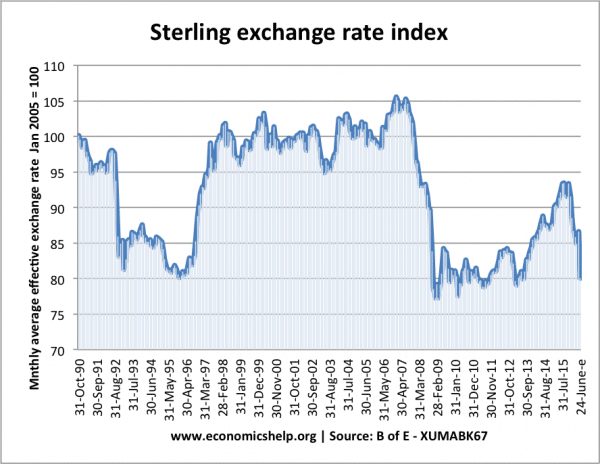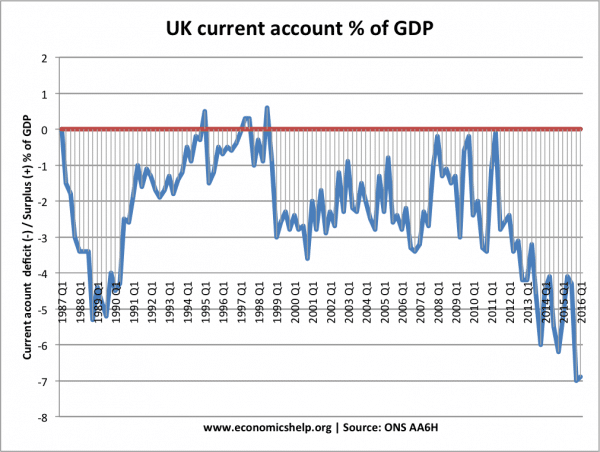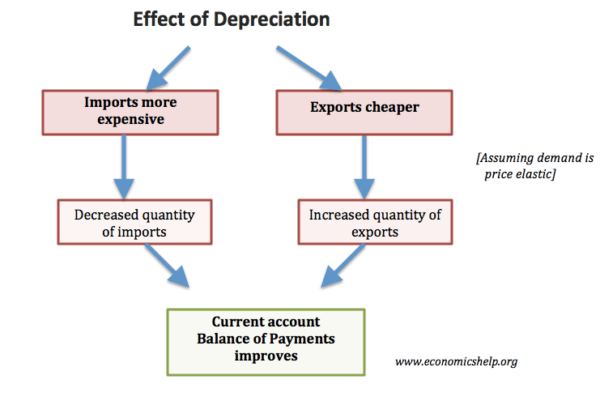Readers Question: Discuss the circumstances in which reducing the exchange rate and introducing quotas are effective policies to tackle a trade deficit.
The trade deficit occurs when the value of imports is greater than the value of exports. This could reflect a lack of competitiveness or high levels of consumer spending on imports.
The trade deficit is a major component of the current account. The current account, balance of payments measures trade in goods/services and investment incomes/transfers
Reducing the exchange rate (devaluation or depreciation)
Reducing the value of the exchange rate can help to reduce a trade deficit. When the value of the Pound falls it makes UK exports more competitive, increasing quantity demanded. A depreciation also makes imports more expensive, reducing demand for imports and foreign holidays. Therefore, we would expect a depreciation to improve the trade deficit.
However, it is not that simple. It depends upon the elasticity of demand.
- If demand for exports is very inelastic. A fall in price (10%) may lead to only a small fall in demand (1%). Therefore, the value of exports will decrease because the lower price decreases revenue.
- However, if demand for exports is elastic. then a fall in price will lead to a bigger % increase in demand. Therefore, there will be an increase in export revenue.
- The Marshall-Lerner condition states that a depreciation in the exchange rate will improve the current account deficit IF PED x + PED M >1
The effect of a depreciation also depends on other things.
- Inflation? If a depreciation causes inflation, then exports may not become more competitive. Therefore, demand will not increase
- Global Recession. If the global economy is in recession, demand for exports will fall, even if the Pound depreciates. Alternatively, if the UK is in a boom our demand for imports will keep rising.
- See: terms of trade and trade deficit – the example of how depreciation in Sterling had little effect on the trade deficit.
Example of UK


- In 1992, the UK experienced a 20% devaluation in the value of the Pound. After 1992, the current account improved – leading to a small surplus in 1995.
Quotas to Reduce Trade Deficit
Import quotas may reduce the value of imports. But, the key question is whether other countries retaliate by placing import quotas on UK exports?
Usually, protectionist measures lead to retaliation and restrictions placed on our exports, so there is no overall improvement.
Also, it would be an unusual policy to implement and would break World Trade Organisation (WTO) rules
Other Policies to Reduce a Trade Deficit
1. Supply Side Policies – these policies aim to improve the productivity and competitiveness of the economy – making UK exports more competitive and attractive. This helps increase exports.
2. Deflationary fiscal policy. This involves higher tax and lower government spending. Higher tax reduces consumers’ disposable income leading to a decline in consumer spending and less spending on imports. Also, the deflationary fiscal policy helps reduce inflation and thereby improve the competitiveness of exports.
Note, deflationary monetary policy could be used. However, higher interest rates would cause an appreciation in the exchange rate and worsen the trade deficit.
Related


Hey, I am from the Unite States and have thought about the use of quotas as a way to decrease the trade deficit that my country has issues with. I think they are a good temporary idea. I think that the United States should tell the countries we have the large trade deficits with that they will go away as soon as we have an equal flow of goods going both ways. The quotas would temporarily keep the flow of goods even. The would only limit the flow of goods into the country to an equal footing to the flow of goods going into the country we have a trade deficit with. So, if they let more of our goods in then we let more of their goods into our country. That is just off the top of my head. I would love to hear your input. Please feel free to email me sometime with your thoughts.